During classical antiquity, Albania was home to several Illyrian tribes such as the Albanoi, Ardiaei, Bylliones, Dassaretii, Enchele, Labeatae, Taulantii, Parthini, Penestae, Amantes, and many others, but also Bryges and Epirote tribes, as well as several Greek colonies established on the Illyrian coast in cooperation with the local Illyrians, notably Epidamnos-Dyrrhachium and Apollonia.

In Albania, World War II began with its invasion by Italy in April 1939. Fascist Italy set up Albania as its protectorate or puppet state. The resistance was largely carried out by Communist groups against the Italian and then German occupation in Albania. At first independent, the Communist groups united in the beginning of 1942, which ultimately led to the successful liberation of the country in 1944.

The 21st Waffen Mountain Division of the SS Skanderbeg was a German mountain infantry division of the Waffen-SS, the armed wing of the German Nazi Party that served alongside, but was never formally part of, the Wehrmacht during World War II. At the post-war Nuremberg trials, the Waffen-SS was declared to be a criminal organisation due to its major involvement in war crimes and crimes against humanity.
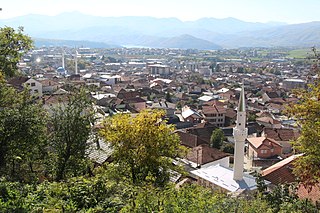
Debar is a city in the western part of North Macedonia, near the border with Albania, off the road from Struga to Gostivar. It is the seat of Debar Municipality. Debar has an ethnic Albanian majority of 74% and is North Macedonia's only city where ethnic Macedonians do not rank first or second demographically. The official languages are Macedonian and Albanian.

The 13th Waffen Mountain Division of the SS Handschar was a mountain infantry division of the Waffen-SS, an armed branch of the German Nazi Party that served alongside but was never formally part of the Wehrmacht during World War II. At the post-war Nuremberg trials, the Waffen-SS was declared to be a criminal organisation due to its major involvement in war crimes and crimes against humanity. From March to December 1944, the division fought a counter-insurgency campaign against communist-led Yugoslav Partisan resistance forces in the Independent State of Croatia, a fascist puppet state of Germany that encompassed almost all of modern-day Croatia, all of modern-day Bosnia and Herzegovina and parts of Serbia.
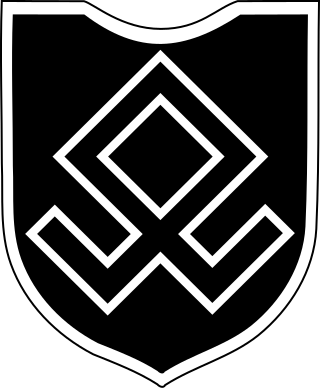
The 7th SS Volunteer Mountain Division "Prinz Eugen", initially named the SS-Volunteer Division Prinz Eugen, was a mountain infantry division of the Waffen-SS, an armed branch of the German Nazi Party that served alongside but was never formally part of the Wehrmacht during World War II. At the post-war Nuremberg trials, the Waffen-SS was declared to be a criminal organisation due to its major involvement in war crimes and crimes against humanity. From 1942 to 1945, the division fought a counter-insurgency campaign against communist-led Yugoslav Partisan resistance forces in occupied Yugoslavia. It was formed in 1941 from both Reich Germans and Volksdeutsche – ethnic German volunteers and conscripts from the Banat, Independent State of Croatia, Hungary and Romania. The division surrendered on 11 May 1945 to Yugoslav Partisan forces.
The Balli Kombëtar was an Albanian nationalist, collaborationist, and anti-communist resistance movement during the Second World War. It was led by Ali Këlcyra and by Midhat Frashëri. The movement was formed by members from the landowning elite, liberal nationalists opposed to communism, and other sectors of society in Albania.

August Schmidhuber was an SS-Brigadeführer who commanded two Waffen-SS divisions in occupied Yugoslavia and Albania during the latter stages of World War II who was executed by the post-war Yugoslav authorities for war crimes. The Waffen-SS was an armed branch of the German Nazi Party that served alongside but was never formally part of the Wehrmacht. At the post-war Nuremberg trials, the Waffen-SS – of which Schmidhuber was a senior officer – was declared to be a criminal organisation due to its major involvement in war crimes and crimes against humanity.

The history of the Jews in Kosovo largely mirrors that of the history of the Jews in Serbia, except during the Second World War, when Kosovo, as part of Kingdom of Albania, was under Italian control and later under German control. The other exception is following the Kosovo War of 1999, when the province began its political separation from Serbia.

The German occupation of Albania occurred between 1943 and 1944 during World War II. Before the armistice between Italy and the Allied armed forces on 8 September 1943, Albania had been in a de jure personal union with and was de facto under the control of the Kingdom of Italy. After the armistice and the Italian exit from the Axis, German military forces entered Albania and it came under German occupation, creating the client-state, the Albanian Kingdom.
Albanian nationalism is a general grouping of nationalist ideas and concepts generated by ethnic Albanians that were first formed in the 19th century during the Albanian National Awakening. Albanian nationalism is also associated with similar concepts, such as Albanianism and Pan-Albanianism, that includes ideas on the creation of a geographically expanded Albanian state or a Greater Albania encompassing adjacent Balkan lands with substantial Albanian populations.
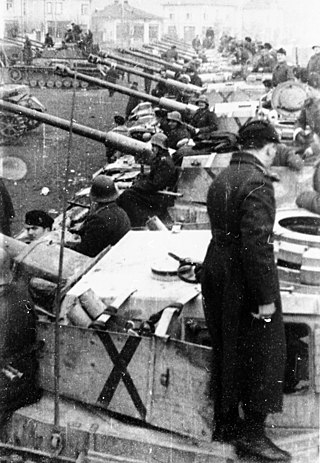
The Kosovo Operation was a series of military operations leading up to one final push during World War II, launched by the Bulgarian army with the assistance of Albanian and Yugoslav Partisans to expel German forces from Kosovo and prevent the retreat of German forces from Greece. German Army Group E was withdrawing through it from Greece towards Bosnia, since the escape route through Niš and Belgrade had been closed by the Yugoslav Partisan, Bulgarian and Soviet forces.
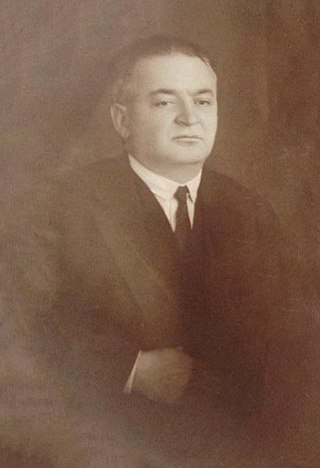
Bedri Pejani was 20th century Albanian politician. During World War II, he was one of the founders of the Second League of Prizren.

Xhafer Deva was a fascist Kosovo Albanian politician during World War II. A notable local politician in Kosovo and in Axis-occupied Albania, he took charge of German-occupied Mitrovica and worked with the Germans to establish a pro-German Albanian government in Kosovo. Following the capitulation of Italy from the war, he helped form a provisional government under German occupation and set up the Second League of Prizren alongside other Albanian nationalists.
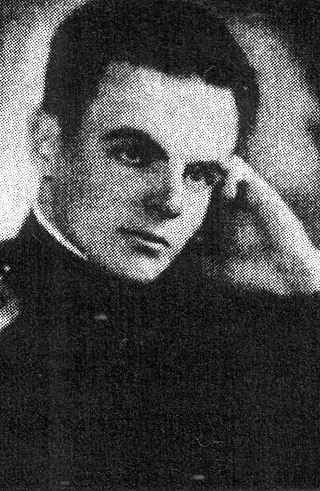
Gajur Dëralla was captain of the Luboten Battalion. The Luboten Battalion was a military division of the Balli Kombëtar which operated in Albania under Fascist Italy and Nazi Germany.
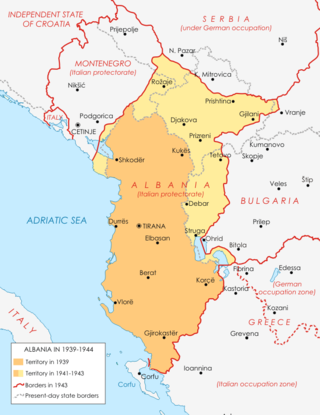
The Holocaust in Albania consisted of crimes committed against Jews in Albania while Albania was under Italian and German occupation during World War II. Throughout the war, nearly 2,000 Jews sought refuge in Albania-proper. Most of these Jewish refugees were treated well by the local population, despite the fact that Albania-proper was occupied first by Fascist Italy, and then by Nazi Germany. Albanians often sheltered Jewish refugees in mountain villages and transported them to Adriatic ports from where they fled to Italy. Other Jews joined resistance movements throughout the country.

The Socialist Autonomous Province of Kosovo, referred to as simply Kosovo, was one of the two autonomous provinces of the Socialist Republic of Serbia within Yugoslavia, between 1945 and 1990, when it was renamed Autonomous Province of Kosovo and Metohija.
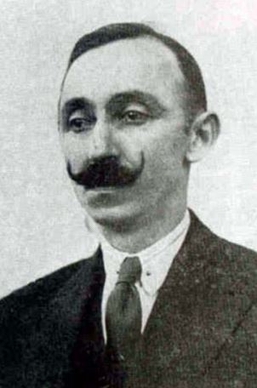
Ismet Bey Kryeziu (1889–1952) was an Albanian political figure during the 1930s and 1940s.
The Velika massacre was the mass killing of between 428 and 550 Serb civilians by the 7th SS Volunteer Mountain Division Prinz Eugen and 21st Waffen Mountain Division of the SS Skanderbeg on 28 July 1944 in the settlement of Velika, in Plav, Montenegro during World War II.

Kosovo during the Second World War was in a very dramatic period, because different currents clashed, bringing constant tensions within it. During World War II, the region of Kosovo was split into three occupational zones: Italian, German, and Bulgarian. Partisans from Albania and Yugoslavia led the fight for Kosovo's independence from the invader and his allies. During occupation by Axis powers, Bulgarian and Albanian collaborators killed thousands of Kosovo Serbs and Montenegrins. Tens of thousands were also expelled or were placed into concentration camps.
















